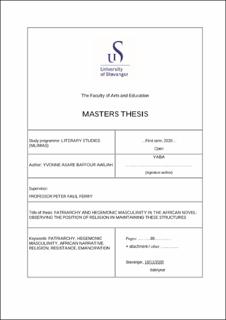| dc.contributor.advisor | Ferry, Peter Paul | |
| dc.contributor.author | Asare Baffour Awuah, Yvonne | |
| dc.date.accessioned | 2021-03-18T09:40:04Z | |
| dc.date.available | 2021-03-18T09:40:04Z | |
| dc.date.issued | 2020-11-16 | |
| dc.identifier.uri | https://hdl.handle.net/11250/2734094 | |
| dc.description | Master's thesis in Literacy Studies | en_US |
| dc.description.abstract | Abstract
Pertinent discussions and arguments have surfaced on the topic of hegemonic masculinities and patriarchy as themes in most African novels. Focus has been thrown on the representation of biased power structures between gender typical of patriarchies. The consistent marginalisation of female characters by male characters and society at large in works by male authors has spearheaded a feminist movement where contemporary female authors have tried to redeem the image of the female character. This study seeks to review the strategies that male dominance is manifested and preserved in the African novel, using Chimamanda Ngozi Adichie’s Purple Hibiscus (2003) as a yardstick.
Religion has been overlooked and undermined in these discussions compared to the scholarly works have named culture and tradition as social institutions that have been used to construct these masculinities. Others have blamed femininity calling it the fuel that enables and enhances patriarchy. A few other works have linked patriarchy to religious beliefs and practices in the African society, suggesting that religion plays a vital role in creating gender inequality in different regions of Africa. Religion has received little attention. This thesis seeks to argue that religion has indeed had an influence on gender inequalities and hegemonic masculinity portrayed in African literary texts. This paper to adds to the growing investigation on patriarchy portrayed in the African novel adding yet another aspect of religion’s position in upholding and justifying the conjectures of patriarchy and hegemonic masculinity and their symbolic representation in the literary text. Using Purple Hibiscus (2003) by Nigerian novelist and playwright, Chimamanda Ngozi Adichie, I will investigate how religion, and in this case Christianity, is used to fuel and maintain the survival of behaviour in male characters, illuminating nuances where religion has assisted the successes of patriarchy. | en_US |
| dc.language.iso | eng | en_US |
| dc.publisher | University of Stavanger, Norway | en_US |
| dc.relation.ispartofseries | Masteroppgave/UIS-HF-IKS/2020; | |
| dc.subject | African narrative | en_US |
| dc.subject | patriarki | en_US |
| dc.subject | hegemonic masculinity | en_US |
| dc.subject | religion | en_US |
| dc.subject | oppression | en_US |
| dc.subject | afrikansk litteratur | en_US |
| dc.subject | literacy studies | en_US |
| dc.title | Patriarchy and Hegemonic Masculinity in the African Novel: Observing the Position of Religion in Maintaining these Structures | en_US |
| dc.type | Master thesis | en_US |
| dc.description.version | submittedVersion | en_US |
| dc.subject.nsi | VDP::Humaniora: 000::Litteraturvitenskapelige fag: 040::Afrikansk litteratur: 058 | en_US |
